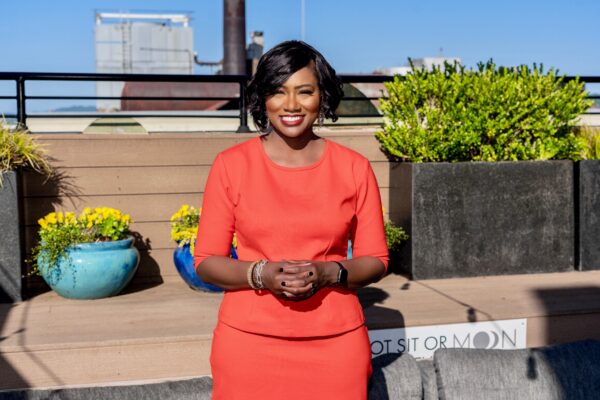 Marsha Morgan’s journey in philanthropy is rooted in her upbringing, deeply engrained values, and desire to positively impact her community. Born in Fort Walton Beach, Florida, but raised in Birmingham, Alabama, Marsha considers Alabama her home. Reflecting on her childhood, her mother and grandmother’s strong influence was pivotal - engaging in school extracurricular activities, teaching Sunday school at church, and taking part in Girl Scouts were a few things “baked into her life.” Giving back was a given, from donating to someone in need to helping a young person at church. “It wasn’t called philanthropy, it was just the right thing to do,” Marsha says, which inspired her to blaze a philanthropy path of her own, leaving a legacy that strategically and intentionally creates positive change.
Marsha Morgan’s journey in philanthropy is rooted in her upbringing, deeply engrained values, and desire to positively impact her community. Born in Fort Walton Beach, Florida, but raised in Birmingham, Alabama, Marsha considers Alabama her home. Reflecting on her childhood, her mother and grandmother’s strong influence was pivotal - engaging in school extracurricular activities, teaching Sunday school at church, and taking part in Girl Scouts were a few things “baked into her life.” Giving back was a given, from donating to someone in need to helping a young person at church. “It wasn’t called philanthropy, it was just the right thing to do,” Marsha says, which inspired her to blaze a philanthropy path of her own, leaving a legacy that strategically and intentionally creates positive change.
Marsha also gives credit to her community at large for shaping her life through affirmations and guidance. “When you are going through school, particularly, college, you don’t always recognize and may even take for granted the fact that you are being invested in,” she says. Traditional philanthropy usually focuses on the “treasure,” but Marsha emphasizes the importance of the time, talent, and testimony invested in a young person’s life and the importance of representation to help them recognize the value in investing in themselves as they get older.
Marsha’s journey to giving circles began when she connected with an individual at her workplace who had a connection to a program officer at the Ford Foundation. Through a commissioned study on how young African Americans in the Deep South were giving back to their communities, the Birmingham Change Fund (BCF) was born. As a founding member, Marsha gathered with a group of passionate, like-minded individuals with the common value of creating positive change in the community. The experience redefined philanthropy for her, rewriting the traditional narrative that philanthropists only look like wealthy billionaires. “My individual resources can be combined with others, and we can collectively help support and fund an organization. But we can take it a step further by volunteering, supplying Board service, and using our influence for advocacy and connection to resources.”
Though BCF is the primary giving circle Marsha is directly involved with, she provides support to other circles through the Community Investment Network, where she has contributed to leadership development and served on the Board of Directors. “The beautiful thing about giving circles is that they allow you to be in community, but also allow you to hear from the community.” Marsha describes how this work provides a partnership that evades the notion of thinking funders have all the answers, rather that the communities closest to the issues are also closest to the solutions.
A key characteristic about a giving circle is the uniqueness of each – every one is different. “We all have our own values, different issues to focus on, and meeting frequencies.” The pandemic also reshaped the landscape and prompted giving circles to use technology and explore innovative approaches. The ways in which giving circles distribute their funds vary widely, too. One giving circle may take a year to conduct extensive research before deciding how to grant and another may meet over lunch and head to the organization to make a grant on the same day.
These differences make the giving circle community strong, offering many options to give. However, one consistent factor for a successful giving circle is trust. Marsha describes how important it is to understand your perspective on money and what it means to collaborate with it. Developing authentic connections with the people in your giving circle allows you to understand their values and intentions – that's how trust is built. She describes how doing this work has strengthened relationships with the community itself and with individuals, and that she has grown close bonds with her circle. “There have not been moments of joy or pain where my giving circle members have not been around – they are family.”
Marsha’s goal is to give strategically, intentionally, and to really understand what kind of positive impact she can have to create lasting systemic change in her community. “The testimony is so important because many people will always assume that people of color aren’t philanthropists, so it dispels that myth and inspires others. It plants seeds so that they can one day do the same thing.” While the treasure is needed and valued, there are many ways to give beyond just dollars.
Marsha gets emotional when she thinks about the legacy she wants to leave in her community someday. “I hope that as I use everything I’ve learned and gained, I ultimately make this world a better place for the next Marsha Morgan. That’s what fuels me – to know that my giving is legacy building and community changing.”
Want to learn more about giving circles? Read about the Foundation’s giving circles and reach out to Natalia Siegel for more information on how you can be a part of this impactful method of giving.
